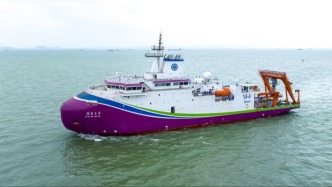The number of confirmed cases of monkeypox globally remains high. According to statistics from the US Centers for Disease and Prevention (CDC), as of June 8, local time, a total of 1,267 cases of monkeypox have been confirmed worldwide, with 37 suspected cases, and 40 countries have reported confirmed and suspected cases of monkeypox. Among them, the United Kingdom still has the highest number of confirmed cases, with a total of 321 confirmed cases, followed by Spain with 233 confirmed cases. Among North American countries, Canada has confirmed 102 cases and the United States has confirmed 40 cases.
According to the population base, the number of monkeypox cases in the United States is significantly lower than that in the aforementioned countries, but this has made American infectious disease experts worry. Their analysis concluded that actual monkeypox cases in the United States are almost certainly underestimated. Part of the reason for this is that the existing monkeypox virus testing policy in the United States creates obstacles, which may waste the limited time to control the epidemic.
Under the current testing regime in the United States, samples for monkeypox virus testing must first be sent to one of 74 laboratories across the country, and then to the Centers for Disease Control and Prevention. Infectious disease experts believe the U.S. government should expand monkeypox testing more broadly and allow more labs to become part of the testing network.
Boghuma Titanji, an assistant professor of infectious diseases at Emory University, told the scientific website www.statnews.com: "If we can't address the bottleneck in testing, we can't quickly pass information to the need to improve Vigilant community network, we will miss the window period to control the spread of the epidemic."
"The U.S. probably has as many cases as Canada or the U.K., and I don't think the number of cases is reliable," Titanji said. "Existing testing is insufficient and we need to do more testing."
A total of 12 states in the United States have reported confirmed cases of monkeypox, according to the Centers for Disease Control and Prevention. The center previously said that recent genetic testing of the monkeypox virus in the United States indicates that at least two different monkeypox virus strains are circulating in the United States, meaning the virus has likely been circulating undetected for some time.
In 2003, there was a small monkeypox outbreak in the United States, when several giant cyst rats and squirrels tested positive for the virus and eventually spread the virus to prairie dogs sold as pets in several Midwestern states. Forty-seven people contracted the disease from prairie dogs, but there was no human-to-human transmission at the time. In July and November 2021, there were two additional travel-related cases of monkeypox in the United States, both of which were confirmed after returning to the United States from Nigeria, a monkeypox-endemic country.
Under the existing monkeypox virus testing system in the United States, if community health workers suspect a patient has monkeypox, they must contact the state health department and send the patient's swab to a laboratory called the Laboratory Response Network. "The agency, which was established by the U.S. government in response to biological or chemical threats, has 74 laboratories in 46 states across the United States. These laboratories can determine whether a sample is positive for orthopoxvirus (monkeypox and smallpox belong to the orthopoxviridae family). The Centers for Disease Control and Prevention says the network is able to conduct nearly 7,000 orthopoxvirus tests a week.
If the sample tests positive, the CDC will conduct confirmatory testing on it. So far, the two-step test is sufficient, the center said, and a person who tests positive for orthopox virus is considered a presumptive monkeypox virus infection, which in turn activates all clinical and containment measures needed for a final diagnosis - This includes contact tracing, vaccinating high-risk contacts, and providing patients with antiviral drugs if necessary.
Jennifer Nuzzo, director of Brown University's new Center for Pandemic Preparedness and Response, commented that the system may be effective in dealing with smaller outbreaks, but it is not suitable for the current outbreak situation. . The U.S. Centers for Disease Control and Prevention said in late May that it was considering how to expand its monkeypox testing capabilities to other labs. But so far, the agency has not had a clear policy shift.
In addition to enhancing testing capabilities, experts also believe that monkeypox infections should be actively sought. "It's going to be a tedious process. But when a disease is spreading in a way that we don't understand, which means we're looking for cases with no known contacts or known links to transmission, it's completely Different ways of coping," Nuzzo said.
According to the information currently available, many patients in this monkeypox outbreak had atypical symptoms, and many infected people reported "relatively mild" symptoms, with the main manifestations including swollen lymph nodes, mainly in the mouth, genitals or around the anus, Sometimes lesions are barely visible. The large discrepancy between what the medical literature describes and what front-line health workers see is worrying infectious disease experts that some monkeypox patients may not feel sick enough to seek medical attention, or even if they do. May not be recognized as having monkeypox.
Joseph Osmundson, a molecular microbiologist at New York University, said: "We have little to no detection of community transmission of this magnitude, nor can we help people make good risk decisions. , to help people protect their loved ones and sexual partners."
Osmondson has prepared an online reference manual on monkeypox virus for men who have sex with men, which includes images of monkeypox-induced anal and genital lesions and information that people can provide clinicians. According to reports from community health groups, some people seeking monkeypox virus testing will find their clinicians reluctant to offer testing, Osmondson said.
Although the World Health Organization and the US Centers for Disease Control and Prevention have repeatedly emphasized that monkeypox will not develop into a pandemic like the new crown, many experts believe that the response to the monkeypox epidemic should still learn from the new crown epidemic. — Timely and adequate testing remains critical.
Ranu Dhillon, a lecturer in global health at Harvard Medical School, said the government should normalize monkeypox testing so it can cast a wider net to find more cases. "We've learned a lot from our response to the Covid-19 outbreak, and it's important to cast a wide net because while most cases are currently found in men who have sex with men, if the monkeypox virus continues to spread, it will almost certainly spread to other crowd."
Luciana Borio, former director of medical and biodefense preparedness at the U.S. National Security Council, also said the U.S. should learn from testing failures at the beginning of the new crown epidemic and include commercial testing in its response to monkeypox. , "It's more efficient," she said.
In a previous interview, Dr. Raj Panjabi, director of the White House Office of Epidemic Preparedness, said, "Many countries around the world have lost the February 2020 window in testing for the new coronavirus. , not just the U.S., we didn't have enough testing at the time."
"In early June, we had a communication within the White House agencies about the monkeypox response to make sure we didn't repeat the same mistakes this time," Panjabi said.
According to the population base, the number of monkeypox cases in the United States is significantly lower than that in the aforementioned countries, but this has made American infectious disease experts worry. Their analysis concluded that actual monkeypox cases in the United States are almost certainly underestimated. Part of the reason for this is that the existing monkeypox virus testing policy in the United States creates obstacles, which may waste the limited time to control the epidemic.
Under the current testing regime in the United States, samples for monkeypox virus testing must first be sent to one of 74 laboratories across the country, and then to the Centers for Disease Control and Prevention. Infectious disease experts believe the U.S. government should expand monkeypox testing more broadly and allow more labs to become part of the testing network.
Boghuma Titanji, an assistant professor of infectious diseases at Emory University, told the scientific website www.statnews.com: "If we can't address the bottleneck in testing, we can't quickly pass information to the need to improve Vigilant community network, we will miss the window period to control the spread of the epidemic."
"The U.S. probably has as many cases as Canada or the U.K., and I don't think the number of cases is reliable," Titanji said. "Existing testing is insufficient and we need to do more testing."
A total of 12 states in the United States have reported confirmed cases of monkeypox, according to the Centers for Disease Control and Prevention. The center previously said that recent genetic testing of the monkeypox virus in the United States indicates that at least two different monkeypox virus strains are circulating in the United States, meaning the virus has likely been circulating undetected for some time.
In 2003, there was a small monkeypox outbreak in the United States, when several giant cyst rats and squirrels tested positive for the virus and eventually spread the virus to prairie dogs sold as pets in several Midwestern states. Forty-seven people contracted the disease from prairie dogs, but there was no human-to-human transmission at the time. In July and November 2021, there were two additional travel-related cases of monkeypox in the United States, both of which were confirmed after returning to the United States from Nigeria, a monkeypox-endemic country.
Under the existing monkeypox virus testing system in the United States, if community health workers suspect a patient has monkeypox, they must contact the state health department and send the patient's swab to a laboratory called the Laboratory Response Network. "The agency, which was established by the U.S. government in response to biological or chemical threats, has 74 laboratories in 46 states across the United States. These laboratories can determine whether a sample is positive for orthopoxvirus (monkeypox and smallpox belong to the orthopoxviridae family). The Centers for Disease Control and Prevention says the network is able to conduct nearly 7,000 orthopoxvirus tests a week.
If the sample tests positive, the CDC will conduct confirmatory testing on it. So far, the two-step test is sufficient, the center said, and a person who tests positive for orthopox virus is considered a presumptive monkeypox virus infection, which in turn activates all clinical and containment measures needed for a final diagnosis - This includes contact tracing, vaccinating high-risk contacts, and providing patients with antiviral drugs if necessary.
Jennifer Nuzzo, director of Brown University's new Center for Pandemic Preparedness and Response, commented that the system may be effective in dealing with smaller outbreaks, but it is not suitable for the current outbreak situation. . The U.S. Centers for Disease Control and Prevention said in late May that it was considering how to expand its monkeypox testing capabilities to other labs. But so far, the agency has not had a clear policy shift.
In addition to enhancing testing capabilities, experts also believe that monkeypox infections should be actively sought. "It's going to be a tedious process. But when a disease is spreading in a way that we don't understand, which means we're looking for cases with no known contacts or known links to transmission, it's completely Different ways of coping," Nuzzo said.
According to the information currently available, many patients in this monkeypox outbreak had atypical symptoms, and many infected people reported "relatively mild" symptoms, with the main manifestations including swollen lymph nodes, mainly in the mouth, genitals or around the anus, Sometimes lesions are barely visible. The large discrepancy between what the medical literature describes and what front-line health workers see is worrying infectious disease experts that some monkeypox patients may not feel sick enough to seek medical attention, or even if they do. May not be recognized as having monkeypox.
Joseph Osmundson, a molecular microbiologist at New York University, said: "We have little to no detection of community transmission of this magnitude, nor can we help people make good risk decisions. , to help people protect their loved ones and sexual partners."
Osmondson has prepared an online reference manual on monkeypox virus for men who have sex with men, which includes images of monkeypox-induced anal and genital lesions and information that people can provide clinicians. According to reports from community health groups, some people seeking monkeypox virus testing will find their clinicians reluctant to offer testing, Osmondson said.
Although the World Health Organization and the US Centers for Disease Control and Prevention have repeatedly emphasized that monkeypox will not develop into a pandemic like the new crown, many experts believe that the response to the monkeypox epidemic should still learn from the new crown epidemic. — Timely and adequate testing remains critical.
Ranu Dhillon, a lecturer in global health at Harvard Medical School, said the government should normalize monkeypox testing so it can cast a wider net to find more cases. "We've learned a lot from our response to the Covid-19 outbreak, and it's important to cast a wide net because while most cases are currently found in men who have sex with men, if the monkeypox virus continues to spread, it will almost certainly spread to other crowd."
Luciana Borio, former director of medical and biodefense preparedness at the U.S. National Security Council, also said the U.S. should learn from testing failures at the beginning of the new crown epidemic and include commercial testing in its response to monkeypox. , "It's more efficient," she said.
In a previous interview, Dr. Raj Panjabi, director of the White House Office of Epidemic Preparedness, said, "Many countries around the world have lost the February 2020 window in testing for the new coronavirus. , not just the U.S., we didn't have enough testing at the time."
"In early June, we had a communication within the White House agencies about the monkeypox response to make sure we didn't repeat the same mistakes this time," Panjabi said.



Comments